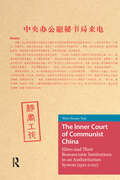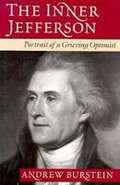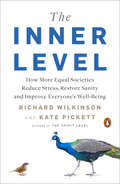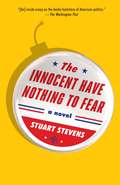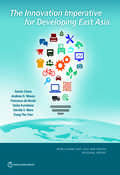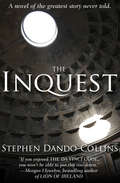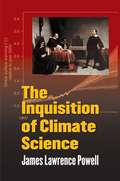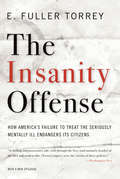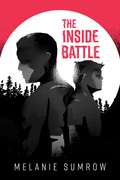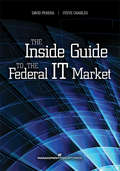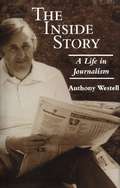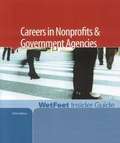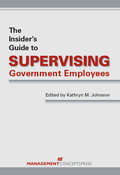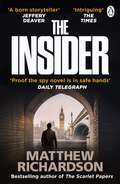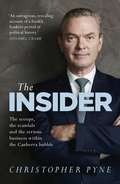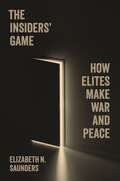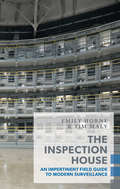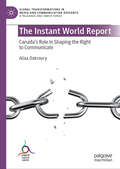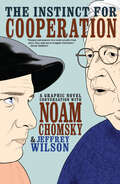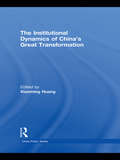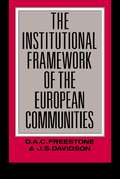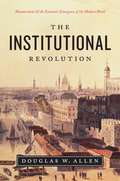- Table View
- List View
The Inner Court of Communist China: Elites and Their Bureaucratic Institutions in an Authoritarian System (1921-2022) (China: From Revolution to Reform)
by Wen-Hsuan TsaiThis book discusses the mishu (staff member, secretary) system and the operation of the Chinese Communist Party between 1921 and 2022, focusing on the system’s impact on high-level politics and decision-making during four key periods. Starting with the Revolutionary War (1921–1945), it moves to the founding of the People’s Republic of China and the beginning of the Cultural Revolution (1950–1966), the period of the Cultural Revolution (1966–1976), and finally the period of reform and opening up, bringing the history to the present day (1976–2022). This is the first systematic analysis of the mishu system, offering new insights on the history of the CCP and modern China.
The Inner Jefferson: Portrait of a Grieving Optimist
by Andrew BursteinAndrew Burstein's The Inner Jefferson: Portrait of a Grieving Optimist at last demystifies the Jefferson of American legend and recovers the eighteenth-century man of sentiment Thomas Jefferson actually was. Burstein confronts widespread misunderstandings about Jefferson's romantic life and provides insight into the contradictions that still surround our third president. He shows Jefferson to have been a man of substance and character, yet possessed of a mean streak, alternately strong and frail, convivial and reclusive, ordinary and extraordinary. Burstein contends that the key to understanding Jefferson's consciousness lies in interpreting the passion expressed in intimate correspondence. Examining seven decades of letters and private accounts, Burstein shows us how Jefferson responded to what he read and how he used particular words and metaphors to express his hopes as well as anxieties and personal trials. The Jefferson revealed is not static; his mind develops over several decades. The Inner Jefferson removes our modern preconceptions and re-creates the mental and moral world of the eighteenth century. Burstein discovers how in the wake of the American Revolution this retiring Virginian could become to some a popular idol while appearing to others a cold and calculating subversive.
The Inner Level: How More Equal Societies Reduce Stress, Restore Sanity and Improve Everyone's Well-Being
by Kate Pickett Richard WilkinsonA groundbreaking investigation of how inequality infects our minds and gets under our skinWhy are people more relaxed and at ease with each other in some countries than others? Why do we worry so much about what others think of us and often feel social life is a stressful performance? Why is mental illness three times as common in the USA as in Germany? Why is the American dream more of a reality in Denmark than the USA? What makes child well-being so much worse in some countries than others? As The Inner Level demonstrates, the answer to all these is inequality. In The Spirit Level Richard Wilkinson and Kate Pickett put inequality at the center of public debate by showing conclusively that less equal societies fare worse than more equal ones across everything from education to life expectancy. The Inner Level now explains how inequality affects us individually, altering how we think, feel and behave. It sets out the overwhelming evidence that material inequities have powerful psychological effects: when the gap between rich and poor increases, so does the tendency to define and value ourselves and others in terms of superiority and inferiority. A deep well of data and analysis is drawn upon to empirically show, for example, that low social status leads to elevated levels of stress hormones, and how rates of anxiety, depression and addictions are intimately related to the inequality which makes that status paramount. Wilkinson and Pickett describe how these responses to hierarchies evolved, and why the impacts of inequality on us are so severe. In doing so, they challenge the conception that humans are inescapably competitive and self-interested. They undermine, too, the idea that inequality is the product of "natural" differences in individual ability. This book draws together many of the most urgent problems facing societies today, but it is not just an index of our ills. It demonstrates that societies based on fundamental equalities, sharing and reciprocity generate much higher levels of well-being, and lays out the path towards them.
The Innocent Have Nothing to Fear: A novel
by Stuart StevensA dark comedy set at a contested Republican convention, written by a veteran political insider--the funniest and most prescient novel about politics in years. "[Stevens] brings a full arsenal of gifts to this enterprise: humor, tactile prose and an insider's knowledge of the hardball tactics employed on the campaign trail.... By far the most interesting parts of this novel are the behind-the-scenes accounts of the tactical and strategic maneuvering of political operatives ...Stevens is a terrific raconteur -- funny, observant and highly entertaining." -Michiko Kakutani The New York Times New Orleans in July: it's hot and sticky and squalid. J. D. Callahan is in the middle of the political race of his life and displeased to be back in his hometown. His candidate, the sitting vice president, is neck and neck with an anti-immigrant, right-wing populist as the Republicans head into their first brokered convention in decades on the heels of a staggering global economic crisis. Soon after a series of dye bombs set off a mass panic and tilt the convention toward the vice president's law-and-order opponent, J. D.'s estranged brother shows up and asks for an inconvenient favor at a most inconvenient time, threatening to reveal a family secret that would ruin the legacy of their civil rights journalist father and destroy J. D.'s own reputation if he doesn't follow through. As J. D. scrambles to contain the damage on all sides, he finds himself contending with a sexy, gun-toting gossip columnist, an FBI agent convinced that J. D. is devious enough to set the bombs himself, and an old corrupt political friend of his late father with a not-so-hidden agenda. For the first time ever, J. D. is forced to reconcile the political career he's always put first with the past he's tried to leave behind as they careen toward each other on a disastrous collision course he may not be able to stop.Hilarious and remarkably sharp, Stuart Stevens's The Innocent Have Nothing to Fear is an endlessly entertaining whodunit and a brilliant satire of our political culture.From the Hardcover edition.
The Innovation Imperative for Developing East Asia (World Bank East Asia and Pacific Regional Report)
by Xavier Cirera Andrew D. Mason Trang Thu Tran Francesca de Nicola KuriakoseAfter a half century of transformative economic progress that moved hundreds of millions of people out of poverty, countries in developing East Asia are facing an array of challenges to their future development. Slowed productivity growth, increased fragility of the global trading system, and rapid changes in technology are all threatening export-oriented, labor-intensive manufacturing—the region’s engine of growth. Significant global challenges—such as climate change and the COVID-19 pandemic—are exacerbating economic vulnerability. These developments raise questions about whether the region’s past model of development can continue to deliver rapid growth and poverty reduction. Against this background, The Innovation Imperative in Developing East Asia aims to deepen understanding of the role of innovation in future development. The report examines the state of innovation in the region and analyzes the main constraints that firms and countries face to innovating. It assesses current policies and institutions, and lays out an agenda for action to spur more innovation-led growth. A key finding of the report is that countries’ current innovation policies are not aligned with their capabilities and needs. Policies need to strengthen the capacity of firms to innovate and support technological diffusion rather than just invention. Policy makers also need to eliminate policy biases against innovation in services, a sector that is growing in economic importance. Moreover, countries need to strengthen key complementary factors for innovation, including firms’ managerial quality, workers’ skills, and finance for innovation. Countries in developing East Asia would also do well to deepen their tradition of international openness, which could foster openness in other parts of the world. Doing so would help sustain the flows of ideas, trade, investment, and people that facilitate the creation and diffusion of knowledge for innovation.
The Inquest: A Novel of the Greatest Story Never Told
by Stephen Dando-CollinsIn the time of Vespasian, just after Rome has crushed the Jewish Revolt, Julius Varro, a Roman Questor (an investigating magistrate )is commissioned to investigate the story that a Jew rose from the dead after being crucified in Jerusalem. Because the fast-growing Nazarene sect founded by the martyr's followers is becoming a threat to the stability of the region, there is much riding on debunking the story. Questor Varro has to deal with the evidence that goes back forty years, with most witnesses long dead and the living ones lying to protect themselves. But he is intent on producing a report that will demolish the claims of these religious fanatics. His investigation stirs intrigue, religious passion, and violence, to say nothing of an attraction to a beautiful Jewish slave girl. Questor Varro's report methodically destroys the myth fueling the newborn Christian movement. But then an extraordinary event occurs that changes everything.
The Inquisition of Climate Science
by James Lawrence PowellScience is under the greatest and most successful attack in modern history. An industry of denial, abetted by media more interested in selling controversy than presenting facts, has duped half the American public into rejecting the facts of climate science--facts showing that human-caused emissions are warming the Earth. The industry of climate science denial is succeeding: public acceptance has declined even as the scientific evidence for global warming has increased. It is vital that the public understand how anti-science ideologues, pseudoscientists, and non-scientists have bamboozled them. We cannot afford to get global warming wrong, yet thanks to deniers and their methods, we are.Jim Powell's The Inquisition of Climate Science is the first book to take on comprehensively the climate science denial movement and the deniers themselves, exposing their lack of credentials, industry funding, and absence of any alternative theory to explain the observed evidence of warming. In this book, readers meet the most prominent deniers and participate in a dissection of their credentials, arguments, and lack of objectivity. James Lawrence Powell shows that the deniers use a wide variety of deceptive rhetorical techniques, many of them going back to the Greeks. While written for the general reader and non-scientist, this book is carefully researched and fully referenced. Readers with an open mind will learn that the evidence of global warming is real and see that an industry of denial has deceived the American public, putting them and their grandchildren at risk.
The Inquisition of Climate Science
by James PowellModern science is under the greatest and most successful attack in recent history. An industry of denial, abetted by news media and "info-tainment" broadcasters more interested in selling controversy than presenting facts, has duped half the American public into rejecting the facts of climate science—an overwhelming body of rigorously vetted scientific evidence showing that human-caused, carbon-based emissions are linked to warming the Earth. The industry of climate science denial is succeeding: public acceptance has declined even as the scientific evidence for global warming has increased. It is vital that the public understand how anti-science ideologues, pseudo-scientists, and non-scientists have bamboozled them. We cannot afford to get global warming wrong—yet we are, thanks to deniers and their methods.The Inquisition of Climate Science is the first book to comprehensively take on the climate science denial movement and the deniers themselves, exposing their lack of credentials, their extensive industry funding, and their failure to provide any alternative theory to explain the observed evidence of warming. In this book, readers meet the most prominent deniers while dissecting their credentials, arguments, and lack of objectivity. James Lawrence Powell shows that the deniers use a wide variety of deceptive rhetorical techniques, many stretching back to ancient Greece. Carefully researched, fully referenced, and compellingly written, his book clearly reveals that the evidence of global warming is real and that an industry of denial has deceived the American public, putting them and their grandchildren at risk.
The Insanity Offense: How America's Failure to Treat the Seriously Mentally Ill Endangers Its Citizens
by E. Fuller Torrey"Vital for all working in the mental health field . . . . Fascinating reading for anyone." --Choice E. Fuller Torrey, the author of the definitive guides to schizophrenia and manic depression, chronicles a disastrous swing in the balance of civil rights that has resulted in numerous violent episodes and left a vulnerable population of mentally ill people homeless and victimized. Interweaving in-depth accounts of landmark cases in California, Wisconsin, and North Carolina with a history of legislation and changes in the mental health care system, Torrey gives shape to the magnitude of our failure and outlines what needs to be done to reverse this ongoing--and accelerating--disaster. A new epilogue on the 2011 shooting in Tucson, Arizona, brings this tragic story up to date.
The Inside Battle
by Melanie SumrowThirteen-year-old Rebel Mercer yearns for his father's approval. His dad suffers from PTSD and spends time in their basement communicating with a racist, anti-government militia group called the Flag Bearers. He doesn't agree with his dad's ideology, but he isn't exactly speaking out against it either. Can Rebel find his voice when it's needed the most?Thirteen-year-old Rebel Mercer lives in west Texas with his dad, Nathan, and his aunt, Birdie. His dad is finally home after serving in the military, and Rebel longs for his approval. But something isn't right. His dad has PTSD, and lately he has been spending his time communicating with a racist, anti-government militia group called the Flag Bearers. Rebel doesn't agree with his dad's newfound ideas, but he turns a blind eye to them. So when his best friend Ajeet beats Rebel at a robotics tournament by using one of Rebel's pieces, Rebel begins to wonder if there's some truth to what his dad has been saying, and he lashes out at Ajeet. Expelled from school, Rebel is taken by his dad to the mountains of Oklahoma, where they meet up with the Flag Bearers. Soon his dad is engulfed in the group and its activities, and they're becoming more and more dangerous. When Rebel gets wind of a planned attack on an African American church, he knows that this group has gone too far and innocent people could get hurt. Can Rebel find his voice and stop the Flag Bearers from carrying out their plans before it's too late? The Inside Battle is a gripping story of family, bravery, and speaking up for what's right from author Melanie Sumrow.
The Inside Guide to the Federal IT Market
by David Perera Steve CharlesUnlock the Door to the Federal IT MarketplaceHere's your key to selling IT goods and services to the government. David Perera and Steve Charles present the ins and outs of successfully competing for—and winning—a share of the tens of billions of dollars the federal government spends each year on IT. Getting a piece of that business is not easy—it takes accurate knowledge of systems and procedures, as well as sharp insight into the structure and details of government procurement.The Inside Guide to the Federal IT Market penetrates the haze of jargon and apparent complexity to reveal the inner workings of the IT contracting process. Whether you're just setting out or seek a bigger share, this comprehensive book provides valuable information you can put to immediate use. The Inside Guide to the Federal IT Market covers:• Technology standards• Basic contracting concepts• Advanced contracting concepts, such as getting on and staying on the GSA schedules• The effect of the federal budget process on the sales cycle• What you need to know about ethics to earn business fairly, without avoidable delays and hassleThis book's focus on the IT market makes it a unique reference on federal procurement for private companies. Government procurement personnel will also find the depth and breadth of coverage useful in reviewing and evaluating IT offerings.
The Inside Story: A Life in Journalism
by Anthony WestellFor political buffs, this is a fascinating view of the politics of the Diefenbaker-Pearson-Trudeau era, including backroom information never before published. For media buffs, its an inside view of the politics of our leading newspapers, and a critical analysis of modern journalism by one who helped to invent it. For those concerned with the great public issues of our times, it’s a controversial account of where constitutional reform went wrong and of how we got to free trade by a journalist who played a significant role in the national debate. But this is more than the record of a professional life. It’s also the personal story of a motherless boy growing up in Britain, his wartime experiences with the Royal Navy, and his decision to emigrate to Canada, with a young family in tow, after publisher Lord Beaverbrook declared the young scribe unfit for promotion because he was the wrong shape: "Small head, big feet, won’t do."
The Insider Guide to Careers in Nonprofits and Government Agencies (2006 edition)
by WetFeetFor the civic-minded, nonprofits and government agencies can be very rewarding places to work. This WetFeet Insider Guide explores profiles of top nonprofit and government organizations; the types of jobs available to MBAs and undergrads; what current nonprofit and government professionals like and dislike about their work; and how to get a foot in the door.
The Insider's Guide to Supervising Government Employees
by Kathryn M. JohnsonEssential Guidance for New and Seasoned Supervisors!Effective supervisors are critical to the future of government. The knowledge, skills, and behaviors required to be an effective supervisor can come only through continuous learning and development.The Insider's Guide to Supervising Government Employees brings together the experiences of diverse supervisors from all aspects of government to offer a rich resource of lessons learned. Whether you are new to the supervisory role or a seasoned supervisor working to improve your and your staff's performance, this book is your practical, go-to guide.Starting with a seven-step, 38-item Supervisor Readiness Assessment, The Insider's Guide helps you determine your readiness to supervise and identify areas you would like to learn more about. You can select a single topic that addresses a particular opportunity you are considering or you can read the book cover to cover to get a fuller view of what it means to be an effective supervisor.As a government supervisor, you have the most important job in all of government. Make the most of it!
The Insider: BESTSELLING AUTHOR OF THE SCARLET PAPERS: THE TIMES THRILLER OF THE YEAR 2023
by Matthew RichardsonThe thrilling novel of espionage and murder set in the dark heart of Westminster, from the UK's most exciting new spy writerA Russian defector is found brutally murdered in a London hotel.Only four people knew he had turned - the four most important and powerful figures in Whitehall.There's only one conclusion:A mole has infiltrated the highest levels of the nation's security.Operating in secret from within Westminster's darkest corners, former spy, Solomon Vine, must uncover the traitor.Because Britain's future hangs in the balance.And with it, the fate of the whole world . . .Praise for Matthew Richardson'Proof that the spy genre is flourishing in the 21st century . . . [Richardson's] plotting has an old-school, Swiss-clock precision' The Guardian'Compelling, intense and sharply authentic' James Swallow, bestselling author of Nomad'A splendid tale of espionage starring an old-fashioned MI6 hero . . . Exciting spy literature' The Times 'A bang-up-to-date thriller told with old-school panache. A great read' Mick Herron, CWA Gold Dagger-winning author of the Slough House Series
The Insider: The scoops, the scandals and the serious business within the Canberra bubble
by Christopher PyneChristopher Pyne has been many things and called many things throughout his long career in politics. Member for Sturt. Minister for Defence. Manager of Opposition Business. Leader of the House. 'The Fixer'. Any Canberra story he doesn't know isn't worth telling.Now, after 26 years, the ultimate insider is outside the House and ready to burst the Canberra bubble with his trademark sharp wit. His revelations of dealings, double dealings, friendships and feuds shine a light on the political processes of those in power: the egos, the sacrifices, the winners, the losers, the triumphs and the failures. From Howard to Rudd, Gillard, Abbott, Turnbull and Morrison, Christopher Pyne has seen and heard it all. The Insider is one of the most brilliant, funny, engaging books by an Australian public figure you'll ever read.
The Insiders’ Game: How Elites Make War and Peace (Princeton Studies in International History and Politics #208)
by Elizabeth N. SaundersHow elites shape the use of force in American foreign policyOne of the most widely held views of democratic leaders is that they are cautious about using military force because voters can hold them accountable, ultimately making democracies more peaceful. How, then, are leaders able to wage war in the face of popular opposition, or end conflicts when the public still supports them? The Insiders&’ Game sheds light on this enduring puzzle, arguing that the primary constraints on decisions about war and peace come from elites, not the public.Elizabeth Saunders focuses on three groups of elites—presidential advisers, legislators, and military officials—to show how the dynamics of this insiders&’ game are key to understanding the use of force in American foreign policy. She explores how elite preferences differ from those of ordinary voters, and how leaders must bargain with elites to secure their support for war. Saunders provides insights into why leaders start and prolong conflicts the public does not want, but also demonstrates how elites can force leaders to change course and end wars.Tracing presidential decisions about the use of force from the Cold War through the wars in Iraq and Afghanistan, Saunders reveals how the elite politics of war are a central feature of democracy. The Insiders&’ Game shifts the focus of democratic accountability from the voting booth to the halls of power.
The Inspection House: An Impertinent Field Guide to Modern Surveillance (Exploded Views)
by Emily Horne Tim MalyIn 1787, British philosopher and social reformer Jeremy Bentham conceived of the panopticon, a ring of cells observed by a central watchtower, as a labor-saving device for those in authority. While Bentham's design was ostensibly for a prison, he believed that any number of places that require supervision--factories, poorhouses, hospitals, and schools--would benefit from such a design. The French philosopher Michel Foucault took Bentham at his word. In his groundbreaking 1975 study, Discipline and Punish, the panopticon became a metaphor to describe the creeping effects of personalized surveillance as a means for ever-finer mechanisms of control. Forty years later, the available tools of scrutiny, supervision, and discipline are far more capable and insidious than Foucault dreamed, and yet less effective than Bentham hoped. Shopping malls, container ports, terrorist holding cells, and social networks all bristle with cameras, sensors, and trackers. But, crucially, they are also rife with resistance and prime opportunities for revolution. The Inspection House is a tour through several of these sites--from Guantánamo Bay to the Occupy Oakland camp and the authors' own mobile devices--providing a stark, vivid portrait of our contemporary surveillance state and its opponents.
The Instant World Report: Canada's Role in Shaping the Right to Communicate (Global Transformations in Media and Communication Research - A Palgrave and IAMCR Series)
by Aliaa DakrouryThis book proposal focuses on Canada's pioneering role in shaping the international understanding of the right to communicate, particularly through the Canadian Telecommission Studies of 1969. The study argues that the 1971 Instant World report, a landmark document, has been overlooked in the existing literature despite its importance in the history of conceptualizing and implementing this human right. The project aims to fill this gap by exploring the historical context of the report and analyzing its contents, shedding light on themes like privacy and indigenous communication rights. Additionally, the manuscript highlights the unique contribution of Betty Zimmerman, the only female Canadian member of the MacBride Commission in 1977, replacing Marshall McLuhan. Zimmerman's insights become pertinent not only for scholars interested in the New World Information and Communication Order but also for feminist studies, showcasing a leading female figure's role in Canadian communication and cultural policy. The research promises a novel and untold perspective on the history of the right to communicate, addressing gaps in international and Canadian communication, women’s studies, and media policy literature.
The Instinct for Cooperation: A Graphic Novel Conversation with Noam Chomsky
by Jeffrey WilsonIn the tradition of Joe Sacco's graphic journalism comes the first interview-based graphic novel treatment of Noam Chomsky's political ideas and activism.An astonishing graphic novel that brings Chomsky's political analysis to bear on real people's stories on the frontlines of America's struggle for economic justice and human dignity. The Instinct for Cooperation innovatively balances those real-life stories of struggle with conversations the author has had with Chomsky on how best to understand them. Although the themes are wide-ranging, this book is ultimately about the importance and need for spaces of resistance in countering state and other institutional forms of violence. For example, when discussing the removal of books by police and sanitation workers from Zuccotti Park in November of 2011, Chomsky paused to say "Arizona knows all about that," referring to the 2010 ban of Mexican American Studies in Tucson schools under Arizona House Bill 2281, which deemed classes that taught "ethnic solidarity" to be illegal. Rather than footnote the reference, Wilson tells that story. Like Joe Sacco's animated political journalism, this book offers a unique perspective on current issues, while providing a major contribution to the understanding of Chomsky's political theories.
The Institutional Dynamics of China's Great Transformation (China Policy Series)
by Xiaoming HuangThis book examines the role of institutions in China’s recent large-scale economic, social and political transformation. The book argues that, although the importance of institutions in China’s rapid economic growth and social development over the past 30 years is widely acknowledged, exactly how institutions affect changes in particular national and historical settings is less well understood. Unlike existing literature, it offers perspectives from a variety of disciplines - including law, economics, politics, international relations and communication studies – to consider whether institutions form, evolve and change differently according to their historical or cultural environments and if their utilitarian functions can, and should be, observed, identified and measured in different ways. The book discusses China’s political and legal institutions; the international institutions with which China engages; institutions promoting science and technology; media companies; and local institutions including the household registration system. It also examines how institutions themselves have been formed, changed and re-formed over recent decades, and suggests theoretical and methodological adjustments in institutional analysis to allow a fuller understanding of the institutional dynamics of China’s transformation.
The Institutional Effects of Executive Scandals
by Brandon RottinghausWatergate, Iran-Contra, Lewinsky, Enron, Bridgegate: according to the popular media, executive scandals are ubiquitous. Although individual scandals persist in the public memory and as the subject of academic study, how do we understand the impacts of executive indiscretion or malfeasance as a whole? What effect, if any, do scandals have on political polarization, governance, and, most importantly, democratic accountability? Recognizing the important and enduring role of scandals in American government, this book proposes a common intellectual framework for understanding their nature and political effects. Brandon Rottinghaus takes a systematic look the dynamics of the duration of scandals, the way they affect presidents and governors' capacity to govern, and the strategic choices executives make in confronting scandal at both the state and national levels. His findings reveal much about not only scandal, but the operation of American politics.
The Institutional Framework of the European Communities
by J. S. Davidson D. A. FreestonAfter more than a decade of British membership of the European Community, there is still a widespread lack of appreciation of what goes on within the Community institutions, and of its significance for UK political and legal processes. This book aims to provide a concise introduction to the institutions and law-making processes of the Community, and to set them im their proper perspective as part of UK public law. The prime focus is upon the Community institutions and their inter-relations, however, reference is also made as appropriate to the effects which Community decision-making has on Westminster and Whitehall and in the English courts. In particular, the book examines the sources of Community law, the organisation and composition of the main institutions after the accession of Portugal and Spain, and the decision-making processes involved in the enactment of the Community's legislation. There are also chapters on the budgetary process and on the role of the European Court of Justice. Despite the UK emphasis some comparative material is used to put the UK approach into perspective. To enhance its value to readers cominig to the subject for the first time, the book also contains the text of selected articles of the Treaty of Rome.
The Institutional Origins of Communal Violence
by Yuhki TajimaWhy are transitions from authoritarian rule often marked by spikes in communal violence? Through examining Indonesia's recent transition to democracy, this book develops a novel theoretical explanation for this phenomenon that also accounts for why some communities are vulnerable to violence during such transitions while others are able to maintain order. Yuhki Tajima argues that repressive intervention by security forces in Indonesia during the authoritarian period rendered some communities dependent on the state to maintain intercommunal security, whereas communities with a more tenuous exposure to the state developed their own informal institutions to maintain security. As the coercive grip of the authoritarian regime loosened, communities that were more accustomed to state intervention were more vulnerable to spikes in communal violence until they developed informal institutions that were better adapted for less state intervention. To test the theory, Tajima employs extensive fieldwork in, and rigorous statistical evidence from, Indonesia as well as cross-national data.
The Institutional Revolution: Measurement and the Economic Emergence of the Modern World
by Allen Douglas W.Few events in the history of humanity rival the Industrial Revolution. Following its onset in eighteenth-century Britain, sweeping changes in agriculture, manufacturing, transportation, and technology began to gain unstoppable momentum throughout Europe, North America, and eventually much of the world with profound effects on socioeconomic and cultural conditions. In "The Institutional Revolution, "Douglas W. Allen offers a thought-provoking account of another, quieter revolution that took place at the end of the eighteenth century and allowed for the full exploitation of the many new technological innovations. Fundamental to this shift were dramatic changes in institutions, or the rules that govern society, which reflected significant improvements in the ability to measure performance whether of government officials, laborers, or naval officers thereby reducing the role of nature and the hazards of variance in daily affairs. Along the way, Allen provides readers with a fascinating explanation of the critical roles played by seemingly bizarre institutions, from dueling to the purchase of one s rank in the British Army. Engagingly written, "The Institutional Revolution" traces the dramatic shift from premodern institutions based on patronage, purchase, and personal ties toward modern institutions based on standardization, merit, and wage labor a shift which was crucial to the explosive economic growth of the Industrial Revolution. "
